« June 2010 | Main | August 2010 »
July 29, 2010
iPensum - Jeg skriver om Apple, for å gi bloggen flere lesere

(Når du har fullført testen over og lest bloggposten under, les dette. Det er en samling sitater fra folk som tenker virkelig smarte ting om iPad.)
Jeg hadde en liten diskusjon med @decibyte, @astronewth og @villahoien i dag om hvorfor journalister skriver så uendelig mye om Apple. Samtidig diskuterte resten av E24-redaksjonen seg i mellom om vi kanskje burde publisere litt færre iSaker.
Vi liker å si at vi skriver "tech news", men det er "brand news", for å stjele et poeng fra @villahoien. Brand news er forsåvidt et helt greit stoffområde for næringslivsjournalister, men at jeg kan sitere aksjekursen til Apple fra Reuters betyr ikke at jeg vet hvordan en iPhone egentlig virker.
De virkelig teknologiinteresserte menneskene jeg kjenner er uansett ikke spesielt glade i Apple-produkter. Sier jeg nettopp det til en Mac-brukende venn, blir de sinte på meg. Jeg har opplevd at noen ble lei seg og gikk sin vei, med kommentaren "Jeg sier ikke stygge ting om din datamaskin."
Og der er vi ved sakens kjerne: Vi skriver om Apple, fordi dere bryr dere så veldig. Fordi "alle" klikker på en sak hvis det er Apple, iPhone eller iPad i tittelen. Fordi hvis jeg blogger om Apple, får jeg flere følgere på Twitter.
De fire mest-leste sakene på E24 i kveld handler om iPhone 4.
Illustrasjon: Handholio CC-BY-SA, via Netthoder, bloggen til NONA (Norwegian Online News Organization)
Les også
Posted by Julie at 11:37 PM | Comments (7) | TrackBack
July 26, 2010
The secret city underneath Paris
To go underground and discover what lies buried beneath Paris, read this.

And then I'll tell you why I wanted you to do so...
I read The Lizard, the Catacombs, and the Clock: The Story of Paris’s Most Secret Underground Society because it was tweeted by Roger Ebert, so it was probably interesting. I had no idea what to expect, except that it would be about Paris and mysteries. Half way through I realized that I didn't even know if what I was reading was true. Was it journalism with literary influences or a short story meant to read like a feature article? It was published in a literary magazine, so was this fiction or non-fiction? I didn't care. I felt like I was reading a short novel. I wanted it to be a longer novel. I wanted someone to make it into a movie. I was imagining the trailer, with smoke drifting around Parisian street corners as members of a secret society emerge from potholes at 5 in the morning, holding hands. The layers of secrecy and confusion of art and reality reminded me of Siri Hustvedt's parallell universe. The journalist didn't know if the sources could be trusted, and as a reader, I didn't know if I could trust my narrator, but I was happy to go along with it all. I wanted to be tricked into believing that if I had just known the right people or taken the right wrong turn in the metro system, I would have discovered a dark and dusty Narnia. I wanted to believe - not know, believe - that there are people who secretly maintain the city of Paris from within.
"I have reached a dead end. Lanso’s secrets are tantalizing, but I can neither confirm nor deny them. UX’s deepest riddles cannot be Googled. The question I ask is, Do I believe them? And then I ask, Do I want to believe them? And then I know my answer."
Image: Zoriah, Creative Commons
Posted by Julie at 10:19 PM | Comments (2) | TrackBack
July 25, 2010
I am a constant gamer

I just started subscribing to the Monday Note, a weekly e-mail newsletter about media and tech business. The first note in my inbox was about me. Or at least people like me, the "digital natives" between 18 and 24 who have more or less grown up online.
A French survey presents our habits. One of the key findings is that we are "constant gamers", modeling our real-life interactions on computer games. We don't trust brands, and see them as the enemy to defeat as we use all available tools to find the best deals online. Some brands, including Apple of course, "have gained access to a unique status of blind trustfulness", but overall we have little respect for authority.
“It mainly results from a generation gap in which management is still in the hands of people who don’t have a clue on how Digital Natives think”, says Edouard Le Marechal, who engineered the survey.
If he means "management is still in the hands of people who rely on surveys to understand how people in their early twenties work", then he is certainly correct.
Here are a few more interesting descriptions of my age group, quoted from Frédéric Filloux, who writes The Monday Note:
- The Digital Native has a problem with authority, but he respects competence.
- Even if they harbor little hope of doing better than their parents, they don’t see themselves as unhappy.
- The Digital Native does not rely on a single group but on several, each with a different degree of trust. The three concentric circles are : close friends and family as the core, a group of 20 to 30 pals whom they trust, and the “Facebook friends” of 200 or so, which acts as an echo chamber.
- The group (...) will organize the importance, the hierarchy of news elements, it will set the news cycle’s pace.
- Wikipedia: because it is crowd-powered and carries an image of neutrality, it is embraced as trustworthy.
This isn't a survey I would focus on too much - it's just about a hundred or so French kids - but I can identify with the findings I've quoted above. I know many of my friends don't trust "the media", by which they mean major newspapers, but look to Facebook and Wikipedia for information and news about what's really going on. I would switch "Facebook friends of 200 or so" to "Twitter feeds of 600 or so" as my third level group, but I appreciate that someone is finally acknowledging that (duh!) we do know the difference between best friends and friends on Facebook.
- For Norwegian readers, a related post: Generasjon Facebook - endelig en bok om meg
Image via nongenderous
Posted by Julie at 9:47 PM | Comments (4) | TrackBack
July 11, 2010
Nerder kommenterer fotball
Her kommenterer Maurice Moss fra den britiske tv-serien The IT Crowd en fotballkamp han har blitt tvunget med på:
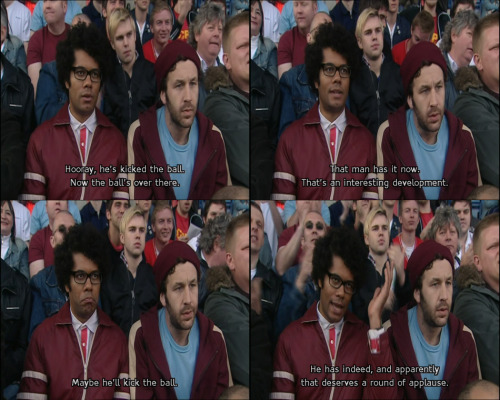
"Hooray, he's kicked the ball. Now the ball's over there. That man has it now. That's an interesting development. Maybe he'll kick the ball. He has indeed, and apparently that deserves a round of applause."
Har du fulgt bloggen eller meg en stund, vet du sikkert at jeg ikke kan eller bryr meg noe særlig om sport. Under vinter-OL i 2006 etterlyste jeg en forklaring på sportshysteriet. En mulig forklaring på skrikende - eller, i Sør-Afrikas tilfelle, tutende - tilskuere, er ifølge Eirik Newth:
"(...)at sport (ikke minst lagsport) er et substitutt for krig, og ut fra det perspektivet gir det absolutt mening at sport får større oppmerksomhet enn f.eks. dans. Idrettsutøverne blir soldater på en ublodig slagmark, og engasjementet for dem som kjemper på vegne av fellesskapet blir deretter.
Men i motsetning til ekte kriger, er seire og nederlag i idretten binære: man vinner eller man taper. Om reglene i de ulike idrettene er komplekse (som offsideregelen i i fotball eller alt som skjer i amerikansk baseball ;) er sluttresultatet så enkelt at alle og enhver kan forstå det. Dermed blir idrettens mål og resultater lette å samle seg om: en idrettsstjerne er utvetydig en som oppnår gode resultater i de store konkurransene. En forfatter, forsker eller danser kan regnes som ledende på sitt felt, men likevel være totalt ukjent utenfor en engere krets.
Denne modellen forklarer også hvordan idretten blir et samlende nasjonalt symbol."
I TIME Magazine har Tony Karon tatt konsekvensen av denne nerdete forklaringen, analysert spansk og nederlandsk historie og vurdert hvem man burde holdt med om finalekampen faktisk var en krig.
Bilde fra The IT Crowd, via nongenderous.
Posted by Julie at 3:53 PM | Comments (1) | TrackBack
July 10, 2010
Why I don't want to read anything written for women
 HegnarOnline, one of the Norwegian business newssites I don't work for, recently launched a "Women's" section on their site.
HegnarOnline, one of the Norwegian business newssites I don't work for, recently launched a "Women's" section on their site.
No, I don't see the point of a special selection of business and finance news stories specifically for girls. I checked out the women's section of this site, and it made me feel insulted. I don't go to a business/finance news site for fashion tips. Not when it's Fall couture season at style.com. And if a woman is interesting enough to be interviewed by a newspaper, men and women should be reading about her.
Trying to sell me media for women sends me the message that all the other media is for men. So since I'm a girl, I can play around in the women's section of business journalism, reading about hairdressers, sushi restaurants and cosmetics companies. That way, the men can be left alone with their technology, stock markets and of course any stories about men making lots of money. No woman would ever want to read about that.
This doesn't make me feel special. I just feel left out.
I enjoy looking through Vogue, because they write about fashion. Not "stuff women are supposed to like", but fashion, for those who like that. I'll also read The Frisky occasionally. It's a blog marketed toward women, but they have a loyal following of male readers who give their perspectives in the comments, and the writers actively encourage men and women to join the discussion.
Despite claiming otherwise, many for-profit websites written specifically for women, are actually just like traditional women's magazines, writes Emily Gould for Slate:
"Glossies make money by exploiting women's insecurities. The editorial content creates ego-wounds ("Do you smell bad? Why isn't he into you?") that advertisers handily salve by offering up makeup and scented tampons. (...) Instead of mimicking the old directly anxiety-making model—for example, by posting weight-loss tips and photos of impossibly thin models like a traditional women's magazine—Jezebel and the Slate and Salon "lady-blogs" post a critique of a rail-thin model's physique, explaining how her attractiveness hurts women. The end result is the same as the old formula—women's insecurities sell ads."
This just reminds me why I don't want to read anything that's "for women" at all. If no man wants to read it, how can it possibly be good enough for me?
When HegnarOnline quoted a story I wrote today, it was on the boys' front page. Hmmm...
Image: PostSecret
Related posts:
Posted by Julie at 9:18 PM | Comments (3) | TrackBack
July 7, 2010
Library fantasies
With one exception (the glasses) the photo below could basically be me in my living room. The more books in a room, the happier I am. But lately I've been spending my free time packing my books into boxes. I'm moving soon, and it is highly unlikely that I will have room for my entire library in my next home. Sigh. In between sorting books into labeled cardboard boxes (Books I Absolutely Must Put On Shelf In Smaller Apartment, Books I Will Reluctantly Relocate To Parents' Attic, Utterly Useless PoliSci Textbooks Whose Pages Can Be Used To Wrap Coffee Cups, Books I Stole From Dad Years Ago, Books I Really Should Return To Ex/Acquintance/That Guy/Despicable Creature Who Absolutely Does Not Deserve Them, Books I Should Just Carry Around In Purses Until I've Read Them Again etc.), I've edited a magazine article about BookCrossing. It's by Marit Letnes, will be published in the next issue of argument, and (spoiler!) contains paragraphs like:
"Books are special objects, carriers of culture, not to be thrown away lightly. Destruction of books is often taboo, as if they have a spirit. They are not like other commodities: They should be given, not just sold."
Hardly the right sentences for me to be repeating over and over in my head when I should be thinking about letting go of my books.
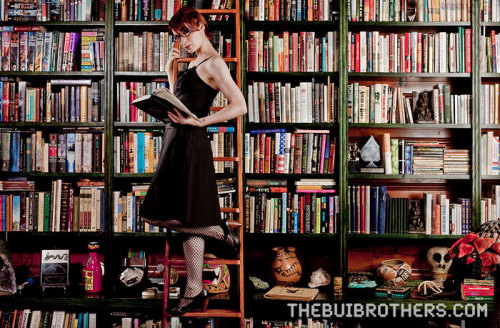
So I fantasize about libraries. So does @nongenderous apparently. Her tumblr is full of library pictures. Read/dream on...
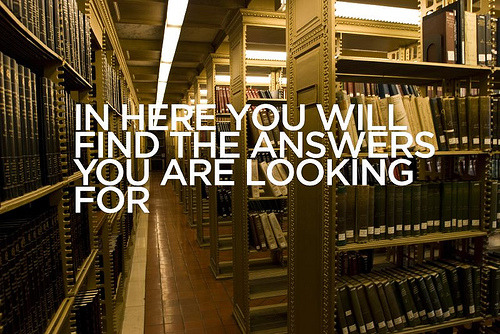
I love the feeling of promise that comes with a library.
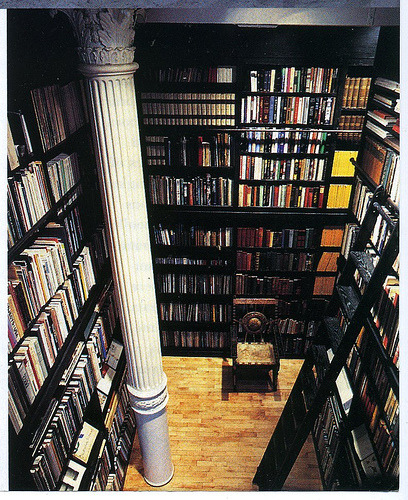
Aahh... No comment necessary. I could live here.

I could live here too, although it is a little too church-like. Who is the monk-like guy above the door? Where is this?

El Ateneo in Buenos Aires, a bookstore in a theater.

Nice. I have no idea where this is either.
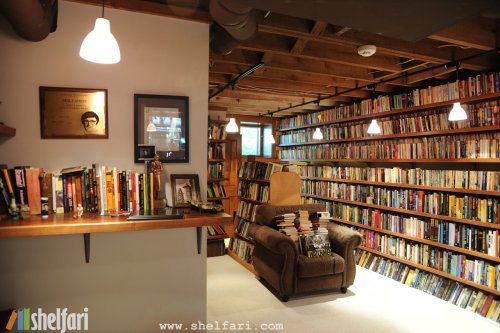
Neil Gaiman's bookshelves. See more from his collection here.

The University of Copenhagen. One should consider the inspirational value of the university library when choosing a university. (Photo by Bo Madsen, I think)

Oh... wow. Biblioteca Joanina, at the University of Coimbra. Too bad I can't read Portugese. (My own university library wasn't ugly, but I probably should have gone to Copenhagen or Coimbra.)

In the process of moving, this is a more realistic idea of what my library looks like.
(All images via nongenderous. Original locations and photographers are usually lost on tumblr, but if you know where the photos are from, please let me know so I can credit and link appropriately. And visit the libraries of course.)
Posted by Julie at 11:32 PM | TrackBack
July 4, 2010
American links for the 4th of July

It's Independence Day! I don't have any 4th of July traditions that can be transferred to Norway (I doubt there will fireworks or lobster today), but I might buy myself some Ben&Jerry's.
Suggested soundtrack: Scarlet's Walk, Tori Amos' album about America. According to Neil Gaiman: "The CD's about America -- it's a story that's also a journey, that begins in LA and crosses the country, slowly heading east." It's on Spotify. This is also the album with one of Tori Amos' most well-known songs, A Sorta Fairytale, with a weird and wonderful music video.
Suggested reading:
- In an alternate universe, I'm American, in which I wonder what would have happened if I never moved to Norway.
- Reasons I love America - I agree with pretty much everything in this post, from the blog Yes and Yes.
- To Kill A Mockingbird, one of my favorite books, or Malcolm Gladwell's New Yorker essay about it.
